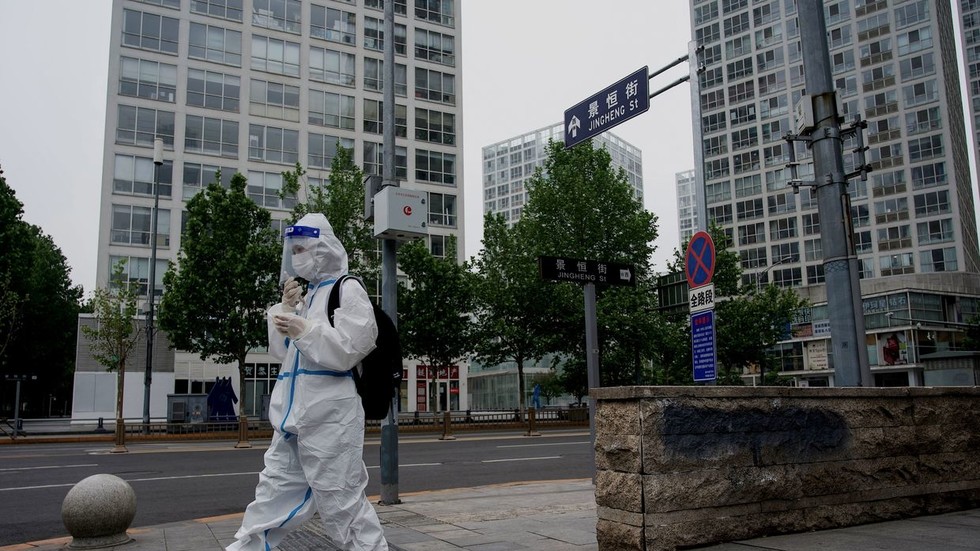
With Covid-19 being old news, China detractors will take every opportunity to portray an ordinary winter outbreak as something sinister
By Timur Fomenko, political analyst

Lockdown due to the Covid-19 coronavirus outbreaks in Beijing on May 10, 2022 © Noel Celis / AFP
News has been spreading throughout the media about a “disease outbreak” in China.
For many, this brings back bad memories. The illness, described as a form of pneumonia, has reportedly gone widespread very quickly, triggering comparisons to how the Covid-19 pandemic emerged. As with the coronavirus, it was not long before there followed accusations of a government cover-up of the extent of the spread.
Cases of the same illness occurring outside of China have been the target of media attention, such as those in Denmark and the US, as has the World Health Organization’s request for more information and Beijing’s response.
In reality, there doesn’t appear to be that much to worry about this time around. The pathogen responsible has already been determined not to be a novel virus and therefore not posing a distinctive new threat to humans the way Covid did. Known as “white lung syndrome,” it is a form of pneumonia that is resistant to some antibiotics and usually causes mild flu-like symptoms. In fact, the aforementioned Denmark suffers nationwide outbreaks every few years.
So, rather than a mysterious political conspiracy wrapped in secrecy and malign intentions, this outbreak has a much simpler explanation: China is facing its first winter after having opened up from its zero-Covid policy and therefore old illnesses are reasserting themselves. But that won’t stop the scaremongering.
Throughout history, it has been a human trait to scapegoat a group of ‘others’ when a disease emerged to threaten the community. Humans are tribalistic creatures, and each social group usually bonds together through a commonly held sense of values and customs, which are deemed superior to those of outsider groups. Disease, however, as abundant as it always has been, contravenes the group’s collective sense of self-esteem, causes misery and consequentially demands accountability on a political level. Because of this, it becomes habitual of human thinking to deflect the origins of a disease outbreak on an outsider group and to frame it as an invasive force which challenges the values they hold, and therefore could not have come from themselves.

Read more
This mode of thinking is especially relevant in the East-West geopolitical dynamic, whereby Western countries hold themselves to be inherently superior and the ultimate standard of civilization in the world. In such thinking, most of the East, be it Asia or the Middle East, is deemed uncivilized, inferior and brutal. This mode of thinking is only confirmed by popular stereotypes, rather than introspecting material, economic and social realities. As a result, it has become commonplace to scapegoat the Eastern world, especially a large and powerful country like China – which happens to also a be a geopolitical adversary to the main Western power, the US – as being a source of disease outbreaks ‘inflicted’ upon the West.
This was the narrative which took hold during the Covid-19 pandemic, as Western media and governments scrambled to deflect attention from unpopular decisions and their dramatic consequences. They sought to blame the Chinese government’s negligence, malice or both, for Covid, and propping up that narrative was an astronomical amount of racism which sought to play on stereotypes about Chinese culinary habits and hygiene, perfectly in line with the West-East mentality of Oriental ‘inferiority’. Anti-communism, especially in the US, was conveniently layered on top of these prejudices, concealing them in a somewhat acceptable manner. Thus, the science of how Covid spreads was ignored in favor of a dramatic political blame game, which was aggressively amplified by the Trump administration.
This time around, there won’t be a new pandemic, but it’s easy to draw false comparisons. It’s a basic fact that for the past three years China has lived under a strict zero-Covid regime which often entailed extreme precautions to prevent the spread of the disease. Entire major cities such as Shanghai found themselves in lockdown, and these restrictions only became more tedious as Covid variants became more transmissive. Because of this, there was no space in the disease ecosystem for flu and other less sensational illnesses, as they were jammed between the rock and hard place of Covid and all these protection measures. Therefore, as soon as China abandoned these restrictions, with the coronavirus having swept through the population, the winter season meant the less severe viruses could spread their wings again.
Despite this, we are likely to see more media headlines about the scary new “Chinese disease,” because fear of disease, and especially fear of disease linked to a fear of China, sells well. Even though this development is a nothingburger, expect some close coverage, baseless speculations, even outright propaganda and hearsay about how things are worse than they seem, how the Communist Party is covering up deaths, how statistics are rigged, hospitals are full, etc. – we’ve heard it all before. The Covid pandemic has been a lesson in how diseases can be politically weaponized to suit an agenda, and in this case it’s happening again at a smaller scale.
The statements, views and opinions expressed in this column are solely those of the author and do not necessarily represent those of RT.




